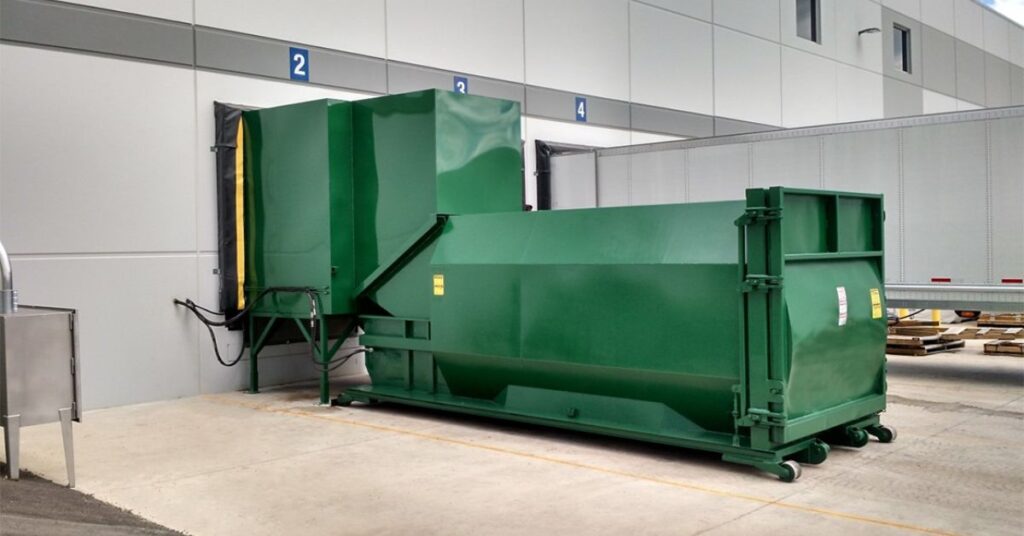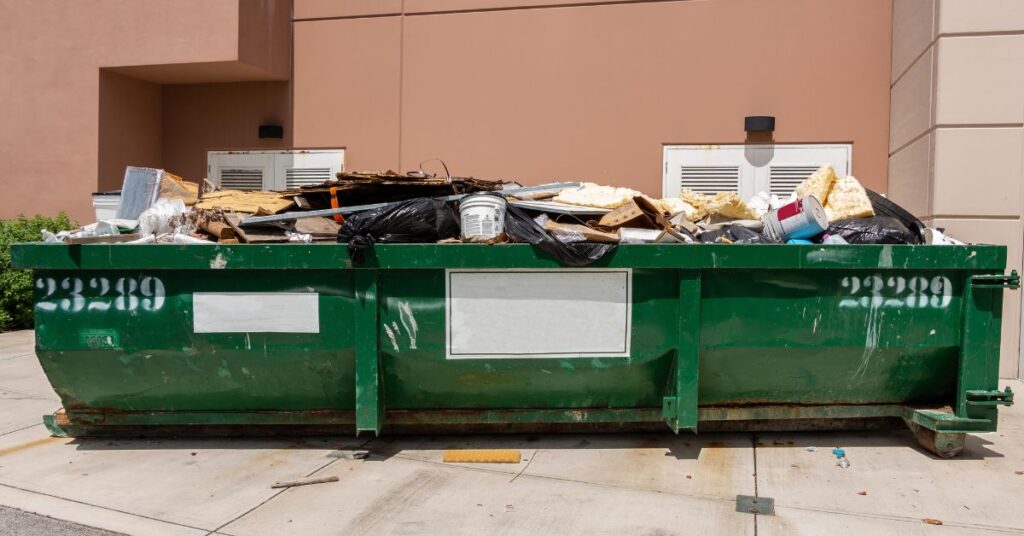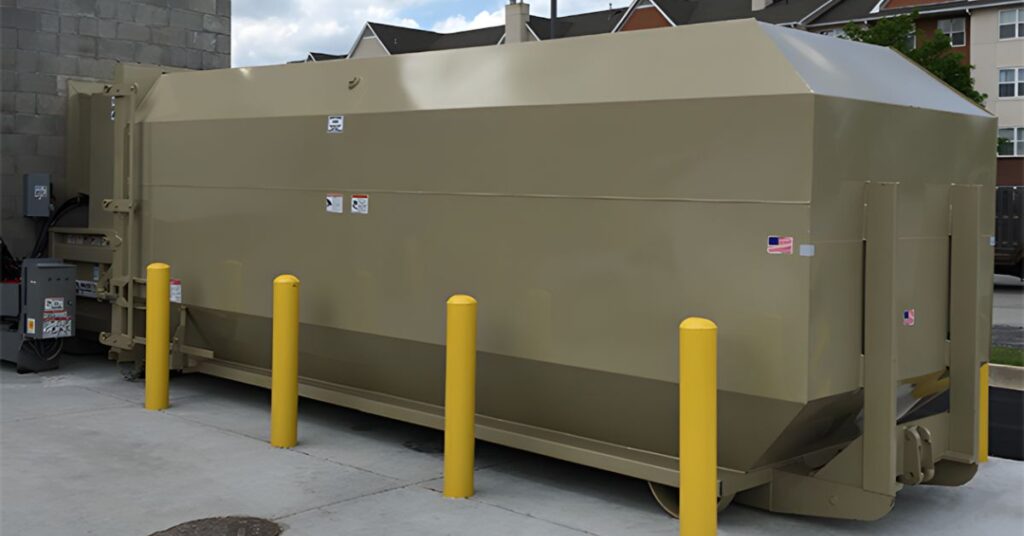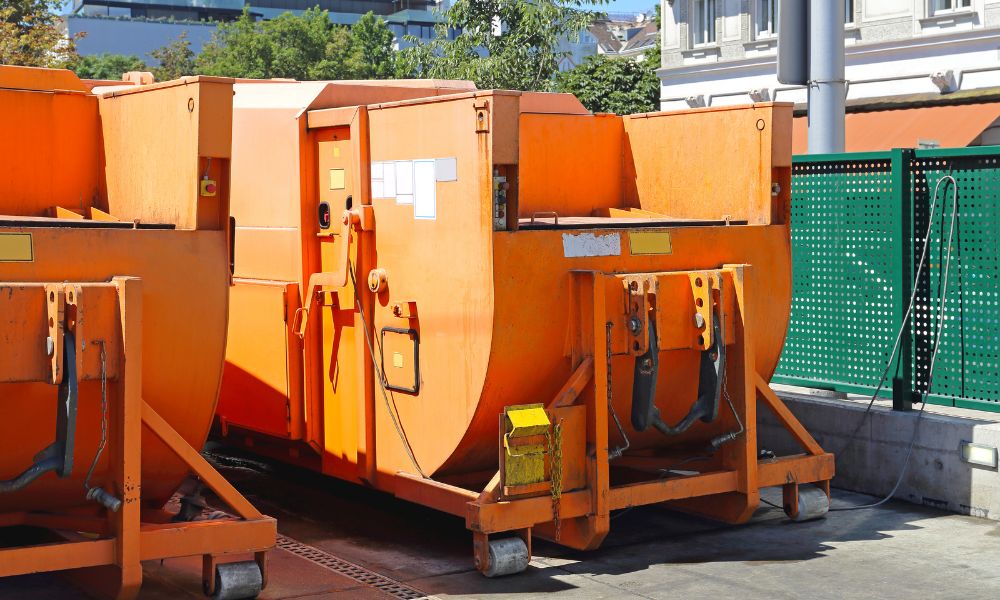Choosing the right waste management solution is a critical decision for any business. Effective waste disposal keeps your premises clean and safe but also influences your budget and environmental footprint. Many businesses default to using traditional dumpsters, but a growing number are discovering the significant advantages of commercial compactors. The first step toward optimizing your waste strategy is learning the differences between these two options.
This comprehensive guide will explain the functions, benefits, and primary differences between compactors and dumpsters. By exploring how each one works and the specific advantages they offer, you can make an informed choice that aligns with your business’s operational needs, financial goals, and sustainability commitments.
What Is a Dumpster and What Is It Used For?
A dumpster is a large, open-top container designed for collecting and holding non-compactable waste. Businesses typically rent dumpsters to manage general trash, construction debris, and other bulky materials that don’t require compression. They are a common sight behind restaurants, retail stores, apartment complexes, and on construction sites.
Dumpsters are ideal for businesses that generate a moderate amount of mixed waste and need a simple, straightforward disposal solution. They come in various sizes, making it easy to find one that fits your space and volume requirements.
What Is a Compactor and What Is It Used For?
A compactor is a powerful machine that compresses waste materials to significantly reduce their volume. Unlike a dumpster, a compactor is a sealed unit that uses a hydraulic ram to crush items like cardboard, paper, plastic, and general trash. This process allows businesses to store a much larger amount of waste in the same amount of space.
Businesses that produce high volumes of compressible waste use compactors, such as supermarkets, hospitals, manufacturing plants, and large retail centers. By reducing the size of their waste, these businesses decrease the frequency of waste pickups and lower their disposal costs.
How Does a Dumpster Work?
A dumpster’s operation is simple. Employees place waste directly into the open-top container throughout the day. When the dumpster is full, a waste management service arrives with a specialized truck to haul the entire container to a landfill or transfer station, replacing it with an empty one or emptying it on-site. The process is straightforward: fill it up, and it gets taken away.
How Does a Compactor Work?
A compactor works through a more advanced process. Someone loads waste into a chamber through a feed opening. Once the chamber is full, an operator activates the machine, and a hydraulic ram extends to crush the waste against a reinforced wall. This cycle repeats until the attached container is full of densely packed material.
A compactor can hold three to five times more compressed waste material than a dumpster of a similar size. When the container is full, it’s collected and transported for disposal. Models like the horizontal compactor are particularly efficient for handling dry waste streams like cardboard and plastics.

Compactors vs. Dumpsters: Which Is More Environmentally Friendly?
Compactors are generally the more environmentally friendly option. By compressing waste, they drastically reduce the number of collection trips required. Fewer truck trips mean lower fuel consumption and a significant reduction in carbon emissions.
Furthermore, a compactor’s sealed system prevents waste from leaking or blowing away, which protects the surrounding environment from pollution. The compressed waste also takes up less space in landfills, conserving valuable land. While dumpsters are a necessary tool for certain waste types, compactors offer a clear advantage for businesses aiming to improve their environmental performance.
What Are the Benefits of Using a Dumpster?
Dumpsters offer several advantages that make them a suitable choice for many businesses.
- Lower Upfront Cost: Renting a dumpster typically involves lower initial costs compared to purchasing or leasing a compactor.
- Ideal for Bulky Waste: They are perfect for non-compressible materials, such as construction debris, old furniture, and large, irregularly shaped items.
- Simplicity: Their use is intuitive, requiring no special training for employees to operate.
- Flexibility: Dumpsters are available in a wide range of sizes and available for pickup as needed, offering flexibility for businesses with fluctuating waste levels.
What Are the Benefits of Using a Compactor?
Compactors provide substantial benefits, particularly for businesses with high volumes of compressible waste.
- Cost Savings: Compactors reduce waste volume, which leads to fewer pickups, lower hauling fees, and significant long-term savings.
- Improved Sanitation: Sealed compactors contain odors and prevent pests, creating a cleaner and more hygienic environment.
- Enhanced Safety and Security: The enclosed design prevents unauthorized access and dumping, improving site security.
- Space Efficiency: A compactor holds more waste in the same footprint as a dumpster, freeing up valuable space on your property.

The Differences Between Compactors and Dumpsters
The primary difference lies in their function: a dumpster simply holds waste, while a compactor actively reduces its volume. This fundamental distinction leads to several other distinctions in cost, efficiency, and environmental impact.
Compactors require a higher initial investment but yield greater long-term savings through reduced collection frequency. They also offer superior sanitation and security, making them a more advanced solution for modern businesses.
Compactors vs. Dumpsters: Which Option Is Right for Your Business?
Choosing between a compactor and a dumpster depends on your specific needs.
A dumpster is likely the right choice if your business:
- Generates a low to moderate amount of waste.
- Produces primarily bulky, non-compressible materials.
- Has a limited upfront budget for waste equipment.
A compactor is the better option if your business:
- Produces high volumes of compressible waste like cardboard, plastic, or paper.
- Wants to reduce long-term operational costs.
- Prioritizes cleanliness, safety, and sustainability.
Making the Right Choice for Waste Management
Selecting the right waste management equipment is a strategic decision that affects your bottom line and brand image. While dumpsters serve a valuable purpose for certain types of waste, commercial compactors offer a superior solution for businesses looking to enhance efficiency, cut costs, and operate more sustainably. By evaluating your waste stream and business goals, you can confidently choose the system that will deliver the best results for your organization.
Choose Compactor Rentals of America to help you find the perfect waste management system for your business. We carefully evaluate your waste streams to determine the best possible solution. Get in touch with our team today!


